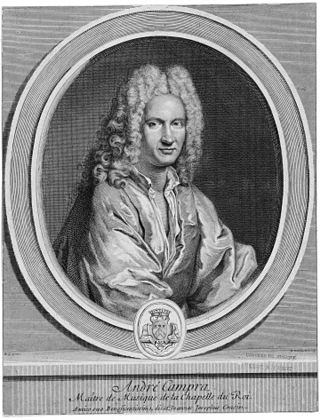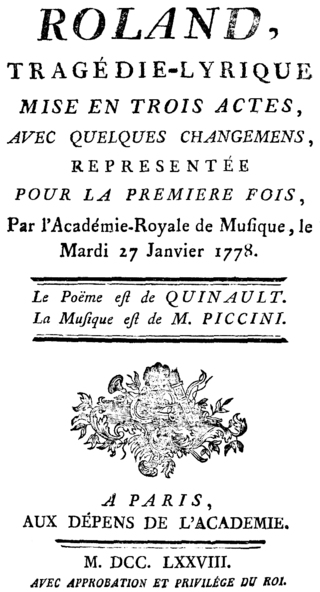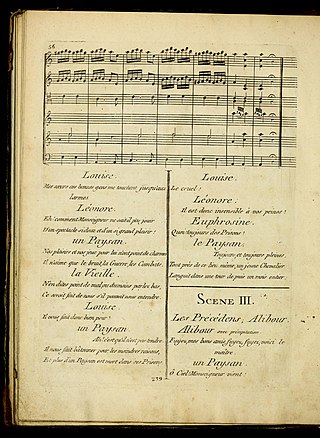Related Research Articles
Mefistofele is an opera in a prologue and five acts, later reduced to four acts and an epilogue, the only completed opera with music by the Italian composer-librettist Arrigo Boito. The opera was given its premiere on 5 March 1868 at La Scala, Milan, under the baton of the composer, despite his lack of experience and skill as a conductor.

Maskarade (Masquerade) is an opera in three acts by Carl Nielsen to a Danish libretto by Vilhelm Andersen, based on the comedy by Ludvig Holberg. It was first performed on 11 November 1906 at Royal Danish Theatre, Copenhagen. Maskarade has enjoyed enduring popularity in Denmark where it is considered to be the country's national opera.

Giove in Argo is an Italian opera by George Frideric Handel. It is one of Handel's three pasticcio works made up of music and arias from his previous operas. The libretto was written by Antonio Maria Lucchini. The opera was first performed at the King's Theatre, Haymarket, London, on 1 May 1739.

Ariodant is an opéra comique in three acts by the French composer Étienne Méhul first performed at the Théâtre Favart in Paris on 11 October 1799. The libretto, by François-Benoît Hoffman is based on the same episode in Ariosto's Orlando Furioso that also inspired Handel's opera Ariodante. The work had a profound influence on the development of Romantic opera, particularly in Germany.
Phyllis Tate was an English composer known for forming unusual instrumental combinations in her output. Much of her work was written for the use of amateur performers and children.
Nerone (Nero) is an opera in four acts composed by Arrigo Boito, to a libretto in Italian written by the composer. The work is a series of scenes from Imperial Rome at the time of Emperor Nero depicting tensions between the Imperial religion and Christianity, and ends with the Great Fire of Rome. Boito died in 1918 before finishing the work.

Alcine is an opera by the French composer André Campra. It takes the form of a tragédie en musique in a prologue and five acts. The libretto, by Antoine Danchet, is based on cantos IV, VI and VII of Ariosto's epic poem Orlando furioso and tells of the love of the enchantress Alcine for the paladin Astolphe (Astolfo).

Iphigénie en Tauride is an opera by the French composers Henri Desmarets and André Campra. It takes the form of a tragédie en musique in a prologue and five acts. The libretto is by Joseph-François Duché de Vancy with additions by Antoine Danchet. Desmarets had begun work on the opera around 1696 but abandoned it when he was forced to go into exile in 1699. Campra and his regular librettist Danchet took up the piece and wrote the prologue, most of Act Five, two arias in Act One, an aria for Acts Two and Three, and two arias for the fourth act. The plot is ultimately based on Euripides' tragedy Iphigeneia in Tauris.
Les âges or Le ballet des âges is an opéra-ballet in a prologue and three acts by the French composer André Campra. The libretto is by Louis Fuzelier. It was first performed by the Académie royale de musique at the Théâtre du Palais-Royal on 9 October 1718.

Roland is a tragédie lyrique in three acts by the composer Niccolò Piccinni. The opera was a new setting of a libretto written by Philippe Quinault for Jean-Baptiste Lully in 1685, specially adapted for Piccinni by Jean-François Marmontel and based on Ludovico Ariosto's epic poem Orlando Furioso. The opera was first performed on 27 January 1778 by the Académie Royale de Musique at the Théâtre du Palais-Royal.
Mârouf, savetier du Caire is an opéra comique by the French composer Henri Rabaud. The libretto, by Lucien Nepoty, is based on a tale from the Arabian Nights. Mârouf was first performed at the Opéra-Comique, Paris, on 15 May 1914. The premiere was a great success and Mârouf became Rabaud's most popular opera. The score makes great use of oriental colour. The Western Hemisphere premiere of Mârouf was given at the Teatro Colón in Buenos Aires on July 24, 1917, with Armand Crabbé as Mârouf, Ninon Vallin as Saamcheddine, and Marcel Journet as the Sultan, conducted by Gino Marinuzzi. The United States premiere of the opera was given at the Metropolitan Opera on December 19, 1917, with Giuseppe De Luca in the title role, Frances Alda as Princess Saamcheddine, and Pierre Monteux conducting. The Viennese premiere was at the Vienna State Opera on 24 January 1929, with Josef Kalenberg and Margit Angerer, and Franz Schalk conducting.
Euridice is an opera in a prologue and one act by the Italian composer Giulio Caccini. The libretto, by Ottavio Rinuccini, had already been set by Caccini's rival Jacopo Peri in 1600. Caccini's version of Euridice was first performed at the Pitti Palace, Florence, on 5 December 1602. Caccini hurriedly prepared the score for the press and published it six weeks before Peri's version appeared.

Faust is an opera by the German composer Louis Spohr. The libretto, by Joseph Karl Bernard, is based on the legend of Faust; it is not influenced by Goethe's Faust, though Faust, Part One had been published in 1808. Instead, Bernard's libretto draws mainly on Faust plays and poems by Friedrich Maximilian Klinger and Heinrich von Kleist. Spohr's Faust is an important work in the history of German Romantic opera.

Antigone is an opera in three acts by Arthur Honegger to a French libretto by Jean Cocteau based on the tragedy Antigone by Sophocles. Honegger composed the opera between 1924 and 1927. It premiered on 28 December 1927 at the Théâtre Royal de la Monnaie with sets designed by Pablo Picasso and costumes by Coco Chanel.

Issé is an operatic pastorale héroïque by the French composer André Cardinal Destouches. Initially it was in three acts. The definitive revised version consists of a prologue and five acts. The libretto was by Antoine Houdar de la Motte. Although Destouches was only 25 at the time of its premiere, it is considered his best score.

Die Gezeichneten is an opera in three acts by Franz Schreker with a German-language libretto by the composer, based on Frank Wedekind's play Hidalla.

Euphrosine, ou Le tyran corrigé is an opera, designated as a 'comédie mise en musique', by the French composer Étienne Nicolas Méhul with a libretto by François-Benoît Hoffman. It was the first of Méhul's operas to be performed, and established his reputation as a leading composer of his time. The premiere was given by the Comédie-Italienne at the first Salle Favart in Paris on 4 September 1790.

Bluthochzeit is an opera in two acts by Wolfgang Fortner. The libretto, also by Fortner, is based on Enrique Beck's German translation of García Lorca's 1933 play Bodas de sangre. It premiered at the Cologne Opera on 8 June 1957.

Tito e Berenice is an opera in three acts composed by Antonio Caldara to a libretto by Carlo Sigismondo Capece. It premiered on 10 January 1714 at the Teatro Capranica in Rome. The story centers on the love affair between Berenice of Cilicia and the future Roman Emperor Titus. The libretto borrows from earlier plays on the same subject by Corneille and Racine (Bérénice), both of which premiered in 1670 and took as their starting point Suetonius's brief account of the love affair in De vita Caesarum.
References
- ↑ Warrack, John; Ewan West (1992). "Franklin, David". The Oxford Dictionary of Opera. Oxford: Oxford University Press. p. 257. ISBN 978-0-19-869164-8.
- 1 2 "Phyllis Tate's Opera: Psychology and Murder in the 1880s": excerpt from The Times, 23 June 1960, in Casebook: Jack the Ripper)
- ↑ Listing from Edition Peters
- ↑ Casaglia, Gherardo (2005). "The Lodger, 16 July 1960" . L'Almanacco di Gherardo Casaglia (in Italian).
- ↑ The Musical Times , Vol 105, No. 1451, January 1964, p. 20
- ↑ Peters's obituary in The Daily Telegraph, 30 May, 2000
- ↑ Denker, Wolfgang. Report from Bremerhaven, Germany. Opera , Vol. 69, No. 9, September 2018, pp. 1087–1088.
- ↑ Harold Rosenthal. Royal Academy of Music, London. The Lodger (Phyllis Tate – world premiere). Opera , September 1960, Vol. 11, No. 9, pp. 648–649.
- ↑ Holden, Amanda; Kenyon, Nicholas; Walsh, Stephen, eds. (1993). The Viking Opera Guide. London: Viking. p. 1081. ISBN 978-0-670-81292-9.